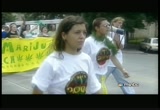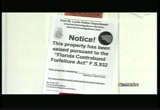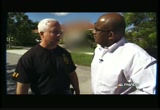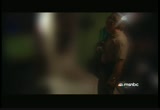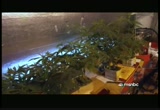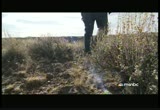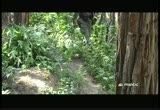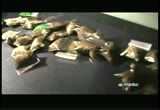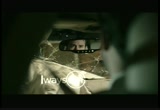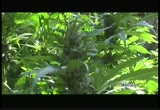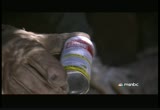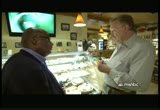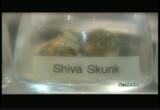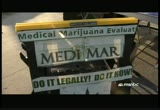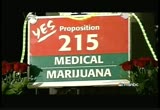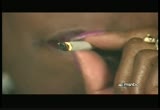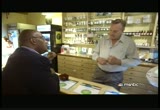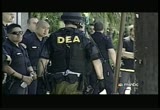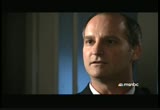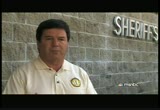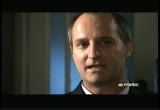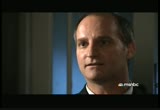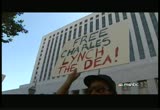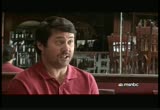tv Al Roker Reporting MSNBC September 25, 2010 2:00pm-3:00pm EDT
2:00 pm
marijuana. it's the most popular illicit drug in america and a multibillion dollar industry. >> these cartels will stop at nothing in furtherance of the almighty dollar. >> you'll never guess where they're growing it. >> i don't think a lot of the public realizes these people are here. >> there's a lot of heat coming out of there. >> could it be in your neighborhood? >> would people be surprised to know that their next door neighbor could be a grower? >> not anymore. >> plus -- >> medical marijuana recommendation. >> some call it a wonder drug. >> it was the only thing that alleviated any of my symptoms. >> a battle brewing in california. >> it is the wild west right now. >> this man could face the rest of his life in prison. >> what happens if charles lynch
2:01 pm
is wrong? >> i'll lose everything if they take me to jail that day. >> why some say marijuana laws aren't working. >> the prohibition of marijuana is much more harmful to the user and society than the actual use of marijuana. >> marijuana -- 100 million americans have tried it and, yet, it remains one of the most controversial drugs. effectively outlawed in 1937, it's become a multibillion dollar industry, with a steady demand and no shortage of supply. in fact, sometimes you needn't look any further than the house next door to find it growing. 7:30 in the morning, miami, florida. agents of the drug enforcement
2:02 pm
agency, dea, and police gather in a parking lot to get briefed on the day's mission. >> going to go to 128 -- >> the plan? to hit a list of homes they suspect are marijuana grow houses. >> the registered owner doesn't live at this address but that's where they delivered it to. >> they have no idea what or whom they'll find. >> anybody got any questions? get your guns. >> every scenario we approach with the same amount of safety because we don't know who's on the other side of the door. >> while much of the city is still waking up, the agents drive ten cars deep onto quiet, suburban streets where they say secret grow houses blend in with the house next door. >> this is a nice neighborhood. nice-looking homes, decent backyards. would people be surprised to know that there are growers --
2:03 pm
their next-door neighbor could be a grower? >> not anymore. this used to be uncommon years ago but now it's quite common. >> police! >> tony says grow houses, while not a new phenomenon, are increasing in size and scope and the typical indoor grow they see, about 100 to 150 plants, is a multimillion dollar operation. each plant yields about a pound of marijuana worth at least $3,500 on the miami streets, and can be harvested three to four times a year. >> florida unquestionably is the nation's capital for grow houses. on the books this year we have over 700 growers and we're looking at a thousand by the end of the year. >> while marijuana generally has a reputation as a mild drug, its illegal cultivation angele says is is serious business, oftentimes involving organized crime. case in point. in 2006 south florida police bust a huge marijuana growing
2:04 pm
operation in the unassuming suburb of port st. lucie, florida, involving 59 houses in all. >> what sets this investigation apart from so many other grow houses that we encounter was the breadth, the level of organization, and the degree of sophistication. >> the operation was masterminded and financed by a new jersey business that recruited mostly cuban immigrants with an irresistible sales pitch -- live in a new home all expenses paid. just one catch. >> under the relocation package, each homeowner agreed to maintain a grow house for a minimum of two years after which the homeowner had the right to sell the house if he so wished and split the gain 50/50. >> the grower also got a quarter share of the profits. some houses earning up to $5 million worth of pot a year. 35 suspects were brought in on federal drug charges and those convicted faced as much as 20 to 40 years in prison. >> will you get calls sometimes
2:05 pm
from people in the neighborhood? >> yes. quite often neighbors see different things, become suspicious and call our hotline. >> but on this day the dea is working on tips from informants and other sources doing what's known as knock and talks -- searches which require the owner's consent. >> is that a successful tactic? will people actually let you come into their house if they're growing stuff inside? >> quite often, yes. >> really. >> you'd be surprised. >> why? >> a lot of times people are cooperative with law enforcement, more so than any other reason i believe that they think the, you know, they know we're on to them and they say, well, you know. you've got me. come on in. >> outside, if no one's home the agents look for certain telltale signs -- spikes in electricity, extra air conditioning units, and homes that don't have that lived-in look. after a few minutes' search agents rule out this house. >> it was clean. there was nothing there. >> but towards the end of the day, the agents think they may have something.
2:06 pm
>> right now we're just waiting on the k-9 to see if he can detect anything. the dog's trained to detect the smell of marijuana. he's the best tool we have to detect that. >> dea agent jeannette moran says she became suspicious during the search as the owner rushes them room to room. >> i've never seen anybody go through a house that quickly opening doors. every door must have been closed. i think we went from one end of the house to the other in three seconds flat. >> once inside the bathroom moran's trained ears perk up. >> we could hear blowers. except if you look at the bathroom, there's no blower attached. you can see all the drywall that's been torn down to help put the grow up. >> the giveaway? a ladder in a clothes closet with a tile in the ceiling carved out. once they climbed the ladder and moved the ceiling tile, it leads to an attic that leads to another tiny room. in it, a marijuana grow. but not the size they're expecting. >> this is a relatively small
2:07 pm
indoor grow, 11 plants, maybe about ten inches to a foot tall. they're not seedlings. they're a little more mature but just getting started. >> angele says even this small grow can yield a surprising amount of money. >> these little plants are deceiving right now. once they grow to maturity they will yield in less than three months 11 pounds of marijuana worth over $50,000. >> there are those who would say, look. you're putting all this effort into this. why don't you concentrate on the bigger drugs -- cocaine, heroin, methamphetamine, prescription pills? is this a good use of time and resources for the dea? >> this is an excellent use of dea resources. we're targeting everything. all the drugs you just mentioned. this issue is very important to us. >> most people would say, hey look. it's marijuana. what's the big deal? >> it's more potent now than ever so the days of the former arguments about it being a mild drug that everybody uses, those days are over.
2:08 pm
>> angele says controlled conditions and sophisticated growing techniques have made marijuana stronger and, therefore, more dangerous. the government considers it a gateway to more serious drugs and spends millions of dollars a year on marijuana law enforcement. pro-marijuana groups argue that in the cases of more potent pot users adjust their intake and smoke less and they say there is no evidence that marijuana leads to harder drugs. as for the government's war on marijuana, they say it's expensive and has had little effect on the millions of users. a drug war raging in our national parks and forests. >> kept thinking if i turn my back i'm going to get a bullet in the back of my head.
2:09 pm
words alone aren't enough. my job is to listen to the needs and frustrations of the shrimpers and fishermen, hotel or restaurant workers who lost their jobs to the spill. i'm iris cross. bp has taken full responsibility for the clean up in the gulf and that includes keeping you informed. our job is to listen and find ways to help. that means working with communities. restoring the jobs, tourist beaches, and businesses impacted by the spill. we've paid over $400 million in claims and set up a $20 billion independently-run claims fund to cover lost income until people impacted can get back to work. and our efforts aren't coming at tax-payer expense. i know people are wondering-- now that the well is capped,
2:10 pm
is bp gonna meet its commitments? i was born in new orleans. my family still lives here. i'm gonna be here until we make this right. ♪ i like your messy hair ♪ i like the clothes you wear ♪ i like the way you sing ♪ and when you dance with me ♪ you always make me smile [ male announcer ] we believe you're at your best when you can relax and be yourself. and at thousands of newly refreshed holiday inn hotels, you always can. holiday inn. stay you. and now stay rewarded with a sweet dilemma. up to five free nights at any of our properties
2:12 pm
stupid way to die, in the middle of the nevada desert over marijuana. >> october, 2008. three biologists were surveying streams and terrain in a remote >> part of northern nevada. >> here's our footprints right here. >> they walked three miles to a canyon when something amidst the gray and brown desert stood out. >> there was a plant that just caught my attention. it was extremely green, five or six feet tall, and looked just out of place. >> one of our co-workers said is this what i think it is? we're like yeah. it looks like marijuana. that's what it is. >> the men, two of whom wished to remain unidentified, thought little of it but a few feet further down they saw another plant. >> he said it looks like that was cut and placed there by somebody. then i got kind of a knot in my stomach and thought, something's not right. >> suddenly two armed men leapt
2:13 pm
up from behind sagebrush. >> it was right here that the two men popped up a little to our left over here. >> they didn't say a word, which made me even more frightened. i could tell immediately that they were hispanic. >> i dropped my walking stick, which is right here. we put our hands in the air. we started saying no, no, no, and started speaking spanish and telling them who we were. >> seconds later, a third man named tony emerged with a rifle. he spoke to them in english. >> he continued to interrogate us, ask us who we were, why we were there. i kept thinking, if i turn my back i'm going to get a bullet in the back of my head. >> after ten minutes of tense negotiating, the growers let the biologists go. >> here's a sample of the black seed ling trays they brought the plants out in. >> the next day when law enforcement rode in the growers were gone. they left behind everything -- shoes, food, clothes, trash, and 800 marijuana plants worth an estimated $5 million. a relatively small grow compared to those seen in the thousands of california, washington, and oregon areas.
2:14 pm
while face-to-face encounters with illegal growers aren't common, the situation represents an alarming trend. armed and dangerous dtos -- drug trafficking organizations -- harvesting marijuana on public lands and remote areas of the country's national parks and forests. >> it's a big problem and seems to be getting worse. >> mark purdle is a special agent in charge with the bureau of land management in nevada. >> we hear all the news reports about all the drug wars going on on the border right now, the murders and shootings and everything and i don't think a lot of the public realizes that these people are here. >> in fact, the office of national drug control policy estimates 65% of the marijuana grown in the u.s. is grown on public lands. the vast majority by mexican cartels. they grow here because it's gotten tougher to smuggle
2:15 pm
marijuana across the border. >> somebody came up with the idea we'll smuggle in our people to grow the marijuana and it cuts down a lot of the logistics. so now they grow it and they sell it right here. >> usually men tending to the fields camp out next to the grow for three to four months at a time. >> you can see they have coffee back here, sugar, a lot of supplies. all the staples. these individuals were staying here for quite a long time. >> in addition to food and supplies, they typically haul in miles of hoses to set up elaborate irrigation systems. >> the water pressure that can build up on these, pretty impressive. it's a good example how much water these guys are using out of the creeks. >> they use tarps to camouflage their activity. >> this here was the main processing area. when we first got here these tarps were all -- it was almost like an enclosed stretcher. maybe 20 by 35-foot structure. almost impossible to see from the air, as you can see.
2:16 pm
>> once law enforcement spots the fields, the growers hear the helicopters and run. the occasional arrest rarely leads to the top guns. >> unfortunately, most of the time those arrests are low level garden workers that don't really know anything. they don't know who the big bosses are. >> but rafael reyes knows all too well who those big bosses are. the most ruthless, violent individuals and organizations in the world today. these cartels will do anything, will stop at nothing in furtherance of the almighty dollar. >> reyes says marijuana is the cartels' cash cow -- cheap to grow and extremely profitable. >> the true and tried method of making money has always been marijuana. it's what allows them to further their bases of operations into other drugs, for example, cocaine, heroin, methamphetamine. they're all fueled by the proceeds generated through marijuana.
2:17 pm
>> and if mexican cartels are our biggest foreign supplier, then the united states consumer is their number one customer. >> that casual consumer doesn't realize what he or she is contributing to indirectly. our guys in mexico are fighting a war. cops are being killed day in and day out. police officers that are being kidnapped, tortured, and murdered to further intimidate and break the will of the people and of brother officers. >> these mexican drug cartels. how much money are we talking about conservatively? >> in the billions and billions of dollars. >> each year? >> each year. >> if you're selling it on the street how much would this amount of marijuana bring? >> in the northeast region that'll generate approximately about $100,000. >> this one package? >> that one package. when you consider the fact that to produce that was just a couple hundred dollars -- >> it's an amazing profit margin. >> the dea says the cartels are extremely inventive when it comes to ways to keep those profits and reach their u.s. customers. not only are they operating on
2:18 pm
public lands but they're building elaborate tunnels that extend underneath the border for almost a half mile. from your basic hole in the ground to now highly sophisticated tunnels that have lighting systems in it, oxygen, railroad tracks. >> railroad tracks? >> railroad tracks. >> it's an endless cycle of drugs, money, and violence. one that a marijuana policy reform lobby says could be stopped in its tracks if marijuana were legalized, taxed, and regulated here -- like alcohol. >> right now in california you don't see drug cartels from mexico setting up and growing grapes. they're not growing grapes to make wine to sell it because it's a regulated market. the profit margin's relatively low because it is a regulated -- and someone who wants to grow grapes can just get a license and do it. >> the marijuana policy project insists marijuana is much safer than alcohol and tobacco and should be treated in much the
2:19 pm
same way. cartels, they say, would have little incentive to be here if there's no money to be made. >> it makes perfect sense to end the marijuana prohibition we've seen on the books since 1937. yes, there will be problems with marijuana use. yes, some people will abuse it. but the prohibition of marijuana is much more harmful to the user and society than the actual use of marijuana. >> one added benefit according to the marijuana policy project, if prohibition ended and marijuana were taxed and regulated, they estimate the combined savings and revenues could be somewhere between $14 billion and $40 billion a year. marijuana as medicine. >> it was the only thing that alleviated my symptoms. homes for those in need? or, maybe you want to help improve our schools? whatever you want to do, members project from american express can help you take the first step. vote, volunteer or donate for the causes you believe in at membersproject.com.
2:20 pm
take charge of making a difference. we need directions to go to... pearblossom highway? it's just outside of lancaster. sure, i can download directions for you now. we got it. thank you very much! onstar ready. call home. hi, daddy! i'm on my way. send to car and...done! you have one saved destination: dillon beach. would you like those directions now? yes, i would. go north on route 1. check it out. i can like, see everything that's going on with the car. here's the gas level. i can check on the oil. i can unlock it from anywhere. i've received a signal there was a crash. some guy just cut me off.
2:21 pm
i'll get an ambulance to you right away. looks like our check engine light's on. can you do a diagnostic check for us? everything's fine. oh, but you've got a loose gas cap. safely connecting you in ways you never thought possible. onstar. live on. oh! just come snuggle with mama. [ male announcer ] missing something? like 2 pairs of glasses fo$99.99 at sears optical, with bifocal lenses for just $25 more per pair. hurry in to sears optical today and don miss a thing.
2:22 pm
2:23 pm
marijuana grows endanger wildlife and the environment. among the fertilizer and food the areas are littered with animal remains. >> found this in the cultivation site, a bear paw cut at the wrist and one of the digits has been cut off. >> the government doesn't have enough resources to clean up the mess. >> stay back around the perimeter. >> so they rely on volunteer groups like the high sierra trail crew. months after this 12,000 plant grow was found in sequoia national forest, the crew flies back to haul out the trash. >> the mess is practically untouched. >> here's what's left of some form of a rifle. >> the team discovers multiple propane tanks. >> these are a major hazard. if a fire was to start in this area, an unsuspecting fire crew could walk into the path of something that would either explode or potentially shoot
2:24 pm
flames 15 or 20 feet away. >> they find pesticides and chemicals, some that have been outlawed in the united states. >> we don't know, what are the long-term effects of these chemicals being washed into our water system, so these go into the creeks that feed the streams that feed the lakes that we recreate in. a lot of people, hunters, fishers, camper men, are ingesting these pesticides. >> brogan and his team average an estimated 15 grow sites a year and just been handed 160 more. >> for every site they find there are four they don't find. there are probably another 500 out here that nobody even knows about. >> for him, marijuana's not a political issue. it's a personal one. >> i grew up in the mountains. i love the mountains. to see this really repulses me. >> medical marijuana, a whole new world in california, where you can buy it in ice cream, cold drinks, and cakes. well, i'm an avid catamaran sailor. i can my own homemade jam, apricot. and i really love my bank's raise your rate cd.
2:25 pm
i'm sorry, did you say you'd love a pay raise asap ? uh, actually, i said i love my bank's raise your rate cd. you spent 8 days lost at sea ? no, uh... you love watching your neighbors watch tv ? at ally, you'll love our raise your rate cd that offers a one-time rate increase if our current rates go up. ally. do you love your bank ?
2:28 pm
i'm melissa ray berg-- mili disreyberger. after the robbery, police questioned the suspects for eight hours. the suspects are still at large. the land of 10,000 lakes is recovering after severe rain fell starting midweek. now back to "al roker reporting, 13 states have passed laws decriminalizing marijuana for medical use but no state is like california, the only one with more than 300 dispensaries, places where people with doctors' recommendations can openly go to buy it. while organizations like the american college of physicians are calling for further research into numerous potential medical uses for marijuana, the food and drug administration says it has
2:29 pm
no accepted medical value. in the eyes of the federal government, it remains illegal in any form. so how does this all play out in california? long considered ground zero of the medical marijuana movement. >> this is the future. >> at the pharmacy, a dispensary in westwood, california, the general manager says the doors are open. >> we don't feel we have anything to hide or anything to be embarrassed about. >> here, with a doctor's recommendation, you can buy medical marijuana or cannabis in just about any form you like, in gelato, in chocolate bars, cold drinks, even lollipops. >> there are three xs on this particular chocolate cake. that means there are three dosages of medicine in there. >> right. what would happen if somebody ate this whole, you know, piece of cake? it has five doses of cannabis in it. >> if they ate it all at once they would be over-medicating.
2:30 pm
okay? there have been zero deaths caused by cannibas. you cannot over dose. you may sleep well that night. you know. >> he says the pharmacy doesn't make a profit and that it abides by strict state laws, buying from designated growers and selling only to those with a doctor's recommendation. >> there is a lot of documentation. >> oh, yeah. everything has to be completely documented. if there is no documentation or anything is out of line or if they don't have a california i.d. that's current, i don't even care if they have it. if it's not current we don't let them in. >> what's the difference between the stuff you buy on the street and the marijuana or cannabis you buy in here? >> everything we have here is organic. all of our caregivers that supply the cannabis have not added anything, any pesticides, anything to change the value of the medicine. what you buy on the street is hit or miss.
2:31 pm
>> you take what you get. >> you take what you get. >> at a dispensary, customers can pick and choose from a wide variety of high grade marijuana. >> they have the opportunity to open it up and get a sense of the aroma. >> now, that smells almost like a tea. >> according to americans for safe access, there are more than 200,000 people in california with a doctor's recommendation for marijuana. >> every doctor i talk to that i asked about it, complications, they said that's the best thing to do. >> in a 2005 interview with "dateline's" stone phillips, melissa etheridge, a breast cancer survivor, talks candidly about using medical marijuana every day during her chemotherapy. >> there's the drug that you take for the pain, but that constipates you so you have to take the constipation drug, but that gives you diarrhea so you need a diarrhea drug.
2:32 pm
instead of taking five or six of the prescriptions, i decided to go a natural route and smoke marijuana. i was doing a lot of it at the time for my pain and for my symptoms and the minute i didn't feel it, i stopped. >> do you worry at all that talking about this from a medicinal standpoint might encourage recreational use? >> do i worry that that will be abused? yeah. i mean, vicodin's abused. everything that brings pain relief is abused. but does that mean, because vicodin is abused do they keep it away from people? no. they prescribe it. put the laws on it. prescribe it. >> it's an argument that's gaining ground across the country but in a place like california where dispensaries advertise in magazines, access to marijuana is easier than ever.
2:33 pm
>> medical marijuana recommendations to have this as opposed to pharmaceuticals and that's why he wants to make sure everyone has access if they need it. >> it's a whole new industry that caters to the very sick and people looking to get high legally. >> there's a lot of recreational users who have a license they got from a doctor because these doctors that give medical marijuana evaluations they call it, i don't know if they're turning anybody away. now i have a license that says i can smoke pot. no one here has that. not in idaho. but you should. >> comedian and marijuana user doug benson stars in "super high me" a movie that chronicles his pot smoking for 30 straight days. >> i agree that if you feel like it helps you in your life and makes you feel better, whether it's anxiety or depression or,
2:34 pm
you know, you just like it, i don't see why you shouldn't have access to it. >> when it came to defining who should have access to it, proposition 215, the 1996 ballot initiative that decriminalized medical marijuana in california purposely left things vague. >> it listed approximately ten conditions but then it said or any condition agreed upon by the physician and the patient where cannibus could be helpful. that leaves it between the doctor and the patient which is where it belongs. >> dr. alan frankel practiced internal medicine for 26 years before dedicating 80% of his practice to medical marijuana. in over two years, he says, he saw 3,400 patients. the average age? close to 50. >> some of these patients are, you know, ceos, there's not one demographic. i mean, we have all the data. it's from everywhere, every income group, every education level. >> they come to him with a wide range of ailments from cancer and hiv to chronic pain, insomnia, and anxiety. >> they come in and sometimes they just can't believe this is
2:35 pm
really happening. and that it's legal. it works. patients come in, oh, i'm a little better. i appreciate it. it's like, this has changed my life. >> what most people never realized, he says, is that there are two different strains of medical marijuana that work to treat different conditions. >> now with the dispensing system we're able to get sativa and indicas and tell people which to use at which time. >> while frankel acknowledges there are legal substitutes that do similar things, he says many people prefer pot's predictable side effects to prescription medicatio medications. >> i think most people agree if nothing else it's extremely safe. if somebody comes in with insomnia, to try using cancan --
2:36 pm
before they go get sleeping pills i think it's completely reasonable. >> frankel says patients don't necessarily need to smoke marijuana. in fact, it's better if they don't. >> it's clearly not the ultimate way to use it. >> he recommends tinctures which were once available. there are strips to put under your tongues and capsules as well. frankel believes the centuries old medicine will one day become accepted treatment in the future not only because of wide-ranging benefits but also because it keeps health care costs low. but the government view couldn't be more different. they say marijuana's harmful and the dispensaries that sell it open up a can of worms for law enforcement. >> we've seen so many abuses, from dispensaries issuing flyers at high schools, handing out free samples to kids to come and try their products. they're definitely not just dispensing marijuana under medical means. >> there are people who have abused the system whether they're pharmacy operators or
2:37 pm
patients. >> correct. >> do you want those people run out? >> absolutely. absolutely. this is serious business. this is medicine. this is not a game. >> leahy says the pharmacy sells in limited quantities to prevent resale on the streets. and one other thing. dispensaries in california pay taxes while no exact data exists, last year the state board of equalization says dispensaries generated at least $11.4 million in sales tax. the board acknowledges the actual number is probably much higher. but despite many dispensaries complying with state guidelines, buying, selling, cultivating, or being in possession of marijuana for any reason is still a federal crime. >> people need to realize
2:38 pm
there's no legal means for anyone to obtain marijuana. >> the dea says it doesn't go after patients or doctors but they do target dispensaries, which they said can be a magnet for crime and illegal drug traffickers. >> we need to look at who's supplying these individuals. where is the marijuana coming from? we're looking at dispensaries who are making huge amounts of money that may being laundered through different means. we look at all those different aspects and determine who's the most egregious of those and try to target those individuals first. >> why don't you get the real criminals? >> but protestors believe the dea goes after dispensaries who make the most noise. >> they take the money. they take the medicine. they don't actually arrest anybody. so essentially this is harassment. >> the u.s. supreme court says when the two laws conflict, federal law trumps state law and the dea says they'll continue to uphold federal law. >> we definitely believe we're having an impact but because there are so many here in los angeles it is a difficult task. >> for bill leahy, whose west
2:39 pm
hollywood store was raided in 2007, trying to operate a legitimate business in such murky territory, is difficult but worth the risk. >> are you worried each day about the dea coming in to shut you down? >> every day we open those doors we practice civil disobedience. every day. does it worry me? sure. >> they put me on the ground there with a gun to my head. >> the feds raid his dispensary and his home. allergy medicati. hoo? omnaris. [ men ] omnaris -- to the nose! [ man ] did you know nasal symptoms like congestion can be caused by allergic inflammation? omnaris relieves your symptoms by fighting inflammation. side effects may include headache, nosebleed, and sore throat. [ inhales deeply ] i told my allergy symptoms to take a hike. omnaris. ask your doctor. battling nasal allergy symptoms? omnaris combats the cause. get omnaris for $11 at omnaris.com. battling nasal allergy symptoms? omnaris combats the cause. words alone aren't enough. our job is to listen and find ways to help
2:40 pm
workers who lost their jobs to the spill. i'm iris cross. we'll keep restoring the jobs, tourist beaches, and businesses impacted by the spill. we've paid over $400 million in claims and set up a $20 billion independently-run claims fund. i was born in new orleans. my family still lives here. i'm gonna be here until we make this right.
2:41 pm
lord of the carry-on. sovereign of the security line. you never take an upgrade for granted. and you rent from national. because only national lets you choose any car in the aisle. and go. you can even take a full-size or above. and still pay the mid-size price. i deserve this. [ male announcer ] you do, business pro. you do. go national. go like a pro.
2:42 pm
2:43 pm
>> why do they do this? they bust the vending machine? oh, man. >> the same day city leaders call for an end to the dea's crackdown. >> our council people, our government, our state and city officials are voting to support medical marijuana patients and it's really, really important that the dea not go against the will of the people that voted this in. >> prior to the raids the dea sends letters to more than 100 landlords of dispensary tenants warning them that they risk property seizure and possible imprisonment. >> our local government condemned the dea's actions for threatening landlords of medical krflt annibu every --
2:44 pm
canibas dispensaries today and also said they don't want the lapd cooperating with the dea. that the lapd has other crime to be looking after and medical >> it's a messy situation that continually plays out across california. >> it's crazy because it's legal to open up a dispensary. local law enforcement doesn't, you know, get involved. >> we know nothing about opt ration inside. we're just here for crowd control. >> the feds come in and bust the places. >> it's the wild west right now in california. >> it's not only the federal law that conflicts with state law. in california, local laws and tolerance for dispensaries vary from county to county and city
2:45 pm
to city. in 2007 the controversy arrived full force in the town of morro bay, california. a year earlier charles lynch, a former software engineer, had opened a dispensary called central coast compassionate care givers. the only medical marijuana facility within 100 miles. for years, charles says, he suffered from debilitating migraine headaches and drove long distances for the drug. >> i decided we kind of needed one in our local area not just for me but for our patients or the patients in our area. >> charles' dispensary had the approval of the local city council and the town mayor, janice peters. >> it was very discreet. anyone passing by would hardly know it was there. >> lynch was asked to join the chamber of commerce and for a time business ran smoothly. >> you felt you were doing everything by the book according to state law? >> oh, yes. i felt definitely so. >> mayor peters agreed that lynch ran a tight ship and she never had a problem. >> i personally went around to every single business around the dispensary, gave them my card, said call the police, too, but please call me if anything concerns you or upsets you about this business. and i never had a single call in the almost year that they were there. >> but the local sheriff investigated the dispensary and
2:46 pm
says some community members did have concerns. >> they didn't like the fact that there were people who from all appearances did not give any signs of having any serious illnesses so they felt there was outward abuse of what the law intended. >> but one of charles' patients, owen beck, was 17 when he came to charles' dispensary with his dad. >> i vomited literally four times a day. >> owen beck was diagnosed with bone cancer his senior year of high school and began six rounds of rigorous chemotherapy. >> it's just terrible, terrible, disgusting feeling all the time. they tried to give me medication for it, pain killers and all kinds of stuff but nothing really worked. >> owen says he couldn't keep the pills down. his doctor recommended medical marijuana and owen talked about it with his dad. >> he was very open to it. just put all political views aside and you know, this is my son and he needs to get better. i think we should try anything that's going to work. >> owen says he'd smoke four times a day and noticed the change immediately.
2:47 pm
>> it was the only thing that alleviated my symptoms. the nausea would go away. i might be able to eat a small meal, get some nutrition for the day. it would relax me, basically. >> a short time later owen said medical marijuana became even more of a necessity when he had to have his leg amputated. >> the phantom pains are the worse. it feels like nails are being nailed into your entire leg, the worst experience ever in my life. but the marijuana did numb the pain a lot. >> back in morro bay, medical marijuana would soon become temporarily unavailable. early one morning in 2007 charles called up his secretary at the dispensary to tell her he was running late. >> she was frantic. she was telling me, charlie, they're here. i says what? >> authorities arrested one of charles' employees for selling marijuana to undercover police agents miles from the dispensary, something charles says he knew nothing about.
2:48 pm
seconds later, charles heard banging at his front door. >> the guy says, search warrant. open up. search warrant. my heart dropped and started pounding. they said, open the door or we're going to bang it down. you know, so i opened the door and about 15 guys with machine guns, bulletproof vests came barreling in through my door. they put me on the ground with a gun to my head. >> the dea was banging on your door the same time they were raiding your dispensary. >> it was a simultaneous raid. >> deputies carried boxes of evidence out of the dispensary around 2:30 this afternoon. the dea would not comment on what was inside them. >> back at charles' house, he was handed a search warrant. >> well, actually after i read the search warrant i kind of felt like they were hoping to find a big, huge grow operation in my house so i found a little bit of relief there.
2:49 pm
>> the dea walked away with charles' computer, his personal medical marijuana supply, and $27,000 he had in the house. but charles wasn't arrested and like many other dispensaries raided before, he reopened a short time later. in hindsight do you think maybe it would have been better if you had just shut down? >> well, actually, i felt like i had a lot of people depending on me. there was definitely a big question in my mind whether i should reopen and i went to the city attorney of morro bay. he told me that, you know, it was okay for me to reopen. >> the reopening was short-lived. charles says the dea called his landlord and told him he risked having his property seized and so charles was forced to close his dispensary for good. >> you figured that's it. you're done. >> right. the dispensary was closed. i was looking for a new job, new
2:50 pm
project. >> just as charles was looking for a fresh start, the dea and local sheriff came knocking again. >> they told me to step outside. told me i was under arrest for, you know, distribution of marijuana on the federal level. >> i know you're a little nervous right now. it's going to be okay. >> okay. >> charles was charged with cultivating and conspiracy to distribute marijuana, operating a drug premises, and selling to minors. his family put up $400,000 in bail while he awaited trial in an ankle bracelet for the next nine months. >> the charges against you, you know, the government brings, are pretty serious. they said you sold marijuana to 250 minors, you made $2.1 million in less than a year. >> actually, can i address those one at a time as you go? >> okay. >> my rules from the city were 18 or older unless accompanied by a parent. okay? but under federal law i found
2:51 pm
out that anybody under 21 is considered a minor. and so they used that law against me to make it sound like i was down on the streets in front of the school yard selling marijuana to minors. >> as for the $2.1 million? charles doesn't deny that might have been his gross proceeds from the business but he says he never profited from his dispensary, which would have been a violation of state law. he says the $2.1 million number didn't account for expenses like paying for the marijuana, payroll, and rent. but the number of customers,
2:52 pm
particularly young people buying marijuana, didn't sit right with the local sheriff. >> this county has a population of about 263,000 people. we had over 2,000 individuals that were going to this facility under the auspices of needing medicinal marijuana. we had over 270 minors, individuals under the age of 21. those large numbers based on our population just seemed to be out of whack. >> at charles' trial, owen beck now in remission was a character witness but his testimony was cut short when he mentioned medical marijuana. the judge had ruled such evidence irrelevant under federal law. >> they didn't allow us to talk about the california state laws that allowed me to do this. they didn't allow us to talk about my business license or the 18 or older stuff. actually they didn't let us talk about a lot of things. >> do you feel like you got a fair trial? >> well, i don't think there was anything fair about federal court. >> after a two-week trial, the jury reached a verdict. >> i just couldn't believe it. >> charles lynch was found guilty on all counts.
2:53 pm
>> the majority of us felt like he was a nice man with good intentions who didn't stay within the parameters of the federal law. >> charles faced five to 85 years in prison. >> they can take me away in cuffs right then and there. my car will be sitting in the parking lot. my house will be, you know, the way i left it. i'll lose everything if they take me to jail that day. >> supporters rally. >> what happened to charles lynch is wrong. >> as charles lynch faces a steep prison sentence. really cooking, you need a little website development. some transparent reporting, so you know it's working. online ads and 1-on-1 marketing consultation. yellowbook's got all that. yellowbook360 has a whole spectrum of tools. the perfect recipe for success. visit yellowbook360.com and go beyond yellow.
2:54 pm
and the 60-day handshake lives on, that five-finger bond that communicates trust, honor, follow-through, and follow-up. it's a promise that says go ahead and buy a ram 1500 or a heavy duty without a payment for 60 days. and if it doesn't do everything you ask it to do... bring it back. ram. until the combination of three good probiotics in phillips' colon health defended against the bad gas, diarrhea and constipation. ...and? it helped balance her colon. oh, now that's the best part. i love your work. [ female announcer ] phillips' colon health. i love your work. host: could switching to geico realis a bird in the handre on worth 2 in the bush?
2:55 pm
appraiser: well you rarely see them in this good of shape. appraiser: for example the fingers are perfect. appraiser: the bird is in mint condition. appraiser: and i would say if this were to go to auction today, appraiser: conservatively it would be worth 2 in the bush. woman: really? appraiser: it's just beautiful, thank you so much for bringing it in. woman: unbelievable anncr: geico. 15 minutes could save you 15% or more.
2:56 pm
thank you everybody for being here. i love you guys. >> it's the fall of 2008. >> free charlie lynch! >> and charles lynch is weeks away from sentencing for selling marijuana at his dispensary in morro bay, california. >> right on. thanks, man. >> thank you. >> here at a medical marijuana expo, he's among
2:57 pm
supporters. >> i wish you well. >> appreciate it. >> and in front of the federal courthouse -- >> if they can take charles lynch they can take anyone standing in this crowd so we have to take a stand. we need another day in court, a fair day in court. we need a new trial for charles lynch. >> i've never been an activist or nothing like that. but it is great to see people making signs and chanting. that was definitely a great day for me. >> but charles says the last few months have taken their toll. >> i'm about to lose my house. it's been difficult finding work. my financial situation is beyond bankruptcy. >> as charles nervously awaits his fate, he sees one glimmer of hope, a change of administration. >> i'm kind of optimistic that, you know, with the new president, hopefully, in the
2:58 pm
coming weeks and the coming months that there may be a policy change at the federal level regarding states' rights. >> barack obama has admitted trying and inhaling marijuana in the past. >> i did. it's not something i'm proud of. it was a mistake as a young man but i never understood that line, the point was to inhale. that was the point. >> during the campaign candidate barack obama said that federal raids on medical marijuana dispensaries would not be a high priority in his administration. he also said that when it comes to medical marijuana, he would defer to states as long as it's based on medical research that it benefits patients and that it's controlled properly. but no matter what the government's view, it may take more than a change of policy to change people's minds about marijuana.
2:59 pm
>> i think pot is still illegal just because it's always been illegal. like it's hard to turn people around to the notion of, this thing that's always been wrong, now we've decided it's okay or it's okay for some people. like it just gets fuzzy. >> there's a lot of misinformation out there about what marijuana's effects and impact on our society are. i think the message that needs to get out there that we're trying to get out there is, one, that marijuana continues to be a dangerous substance and we're trying to make our community safer. >> most people really don't get it until it hits home and then they become an advocate. that's true with everything. then all of a sudden they're like, wow. a light bulb comes on. and the light bulb needs to come on throughout the country. >> that's all for this edition of "al roker reporting."
276 Views
IN COLLECTIONS
MSNBC Television Archive
Television Archive  Television Archive News Search Service
Television Archive News Search Service 
Uploaded by TV Archive on

 Live Music Archive
Live Music Archive Librivox Free Audio
Librivox Free Audio Metropolitan Museum
Metropolitan Museum Cleveland Museum of Art
Cleveland Museum of Art Internet Arcade
Internet Arcade Console Living Room
Console Living Room Books to Borrow
Books to Borrow Open Library
Open Library TV News
TV News Understanding 9/11
Understanding 9/11
